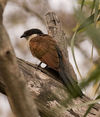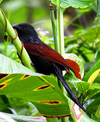Genus Centropus
Brown Coucal - The Andaman Coucal or Brown Coucal is a species of cuckoo in the Cuculidae family. It is found on the Andaman Islands in India and the adjacent Coco Islands in Myanmar. Its natural habitats are subtropical or tropical moist lowland forests and subtropical or tropical mangrove forests.
Gabon Coucal - The Gabon Coucal is a species of cuckoo in the Cuculidae family. It is found in Angola, Cameroon, Central African Republic, Republic of the Congo, Democratic Republic of the Congo, Equatorial Guinea, and Gabon.
New Britain Coucal - The White-necked Coucal or Pied Coucal is a species of cuckoo in the Cuculidae family. It is endemic to the Bismarck Archipelago in Papua New Guinea. Its natural habitat is subtropical or tropical moist lowland forests.
Bernstein's Coucal - The Black-billed Coucal or Lesser Black Coucal is a species of cuckoo in the Cuculidae family. It is found in Indonesia and Papua New Guinea.
Bay Coucal - Its natural habitats are subtropical or tropical moist lowland forests and subtropical or tropical moist montanes.
Biak Coucal - Its natural habitat is subtropical or tropical moist lowland forests. It is threatened by habitat loss.
Ceylon Coucal - The Green-billed Coucal, Centropus chlororhynchos , is a member of the cuckoo order of birds, the Cuculiformes, which also includes the roadrunners, the anis, and the Hoatzin.
Coppery-tailed Coucal - The Coppery-tailed Coucal is a species of cuckoo in the Cuculidae family. It is found in Angola, Botswana, Democratic Republic of the Congo, Malawi, Namibia, Tanzania, Zambia, and Zimbabwe.
Large Coucal - The Goliath Coucal is a species of cuckoo in the Cuculidae family. It is endemic to Indonesia.
Black Coucal - The species has the role of sexes reversed with the males tending the nest while females are polyandrous and maintain territories. Studies on the hormonal system show that Progesterone is responsible for controlling the aggressiveness of females.
Black-throated Coucal - The Black-throated Coucal is a species of cuckoo in the Cuculidae family. It is found in west Africa in dense second growth along forest edge and grassy swamps. The subspecies found in northern and central Zaire is sometimes split as Neumann's Coucal, Centropus neumanni.
Black-faced Coucal - Its natural habitat is subtropical or tropical moist lowland forests.
Greater Black Coucal - The Ivory-billed Coucal or Greater Black Coucal is a species of cuckoo in the Cuculidae family. It is found in Indonesia and Papua New Guinea. Its natural habitat is subtropical or tropical moist lowland forests.
Buff-headed Coucal - This species is a large cuckoo with a heavy bill and short wings. The plumage of adults is striking with a buff head, upper back and undersides, and glossy black wings, lower back and tail. The iris is red and legs and bill are dark grey. Juveniles are very differently colored, with the wings and tail reddish brown with black barring somewhat like in the allopatric Pheasant Coucal, and the rest of the plumage brown mottled with black. The iris is brown-grey and the bill is bicolored, brown above and pale horn below.
Blue-headed Coucal - The Blue-headed Coucal is a species of cuckoo in the Cuculidae family. It is found in Angola, Benin, Burundi, Cameroon, Central African Republic, Chad, Republic of the Congo, Democratic Republic of the Congo, Ivory Coast, Equatorial Guinea, Eritrea, Ethiopia, Gabon, Ghana, Guinea, Guinea-Bissau, Kenya, Liberia, Mali, Nigeria, Rwanda, Sudan, Tanzania, Togo, and Uganda.
Sunda Coucal - Its natural habitats are subtropical or tropical mangrove forests, subtropical or tropical dry shrubland, and swamps. It is threatened by habitat loss.
Pheasant Coucal - The Pheasant Coucal's summer voice is a low descending 'boop boop boop'. Its winter voice is a sharp hissing.
Short-toed Coucal - The Short-toed Coucal is a species of cuckoo in the Cuculidae family. It is found in Brunei, Indonesia, Malaysia, and Thailand. Its natural habitats are subtropical or tropical moist lowland forests and subtropical or tropical moist shrubland. It is threatened by habitat loss.
Senegal Coucal - It is a widespread species through Africa, except the northwest and into south Arabia. The Senegal Coucal is a bird of grassy habitats with trees, such as bush and savannah. It nests off the ground in vegetation, and the typical clutch is 2-4 eggs laid in a large nest built from stalks and leaves.
Greater Coucal - They are weak fliers that clamber in vegetation or walk on the ground searching for their food of insects, eggs and nestlings of other birds. They have a deep resonant call that makes it a bird that brings omen in many parts of its range.
Kai Coucal - The Kai Coucal is a species of cuckoo in the Cuculidae family. It is endemic to Indonesia.
Steere's Coucal - Its natural habitat is subtropical or tropical moist lowland forests. It is threatened by habitat loss.
White-browed Coucal - The southern subspecies is sometimes split as Burchell's Coucal, Centropus burchelli. According to popular Southern African lore, this species' distinctive call, which resembles water pouring from a bottle, is said to signal impending rainfall, earning the bird the affectionate moniker Rainbird.
Madagascar Coucal - The Malagasy Coucal or Madagascar Coucal is a species of cuckoo in the Cuculidae family. It is found in Madagascar, the Comoros and the Seychelles where it occurs on Aldabra and formerly on Assumption Island and Cosmoledo. Its natural habitats are subtropical or tropical moist lowland forests and subtropical or tropical mangrove forests.
Rufous Coucal - Its natural habitat is subtropical or tropical moist lowland forests. It is threatened by habitat loss.
Violet Coucal - Formerly classified as a Species of Least Concern by the IUCN.
Philippine Coucal - The Philippine Coucal is a species of cuckoo in the Cuculidae family. It is endemic to the Philippines.








